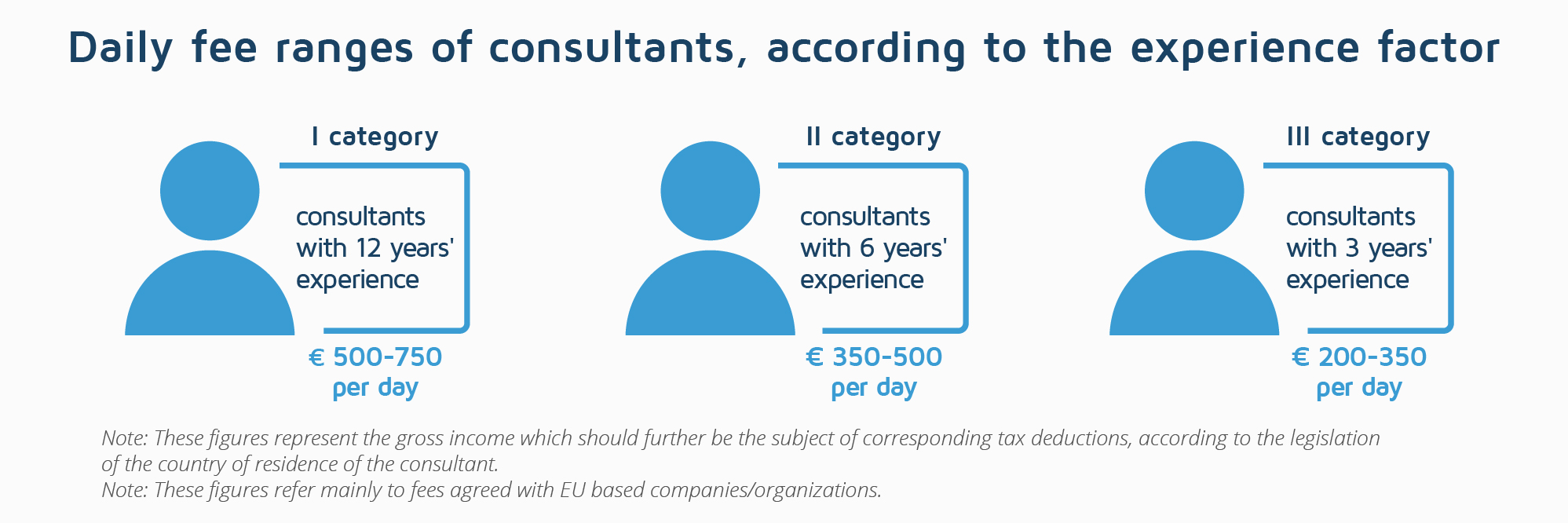A consultancy fee is the payment a development consultant receives for his work on a particular project, which can be supplemented with per diems to cover additional work-related costs. This article, from a DevelopmentAid specialist, aims to introduce some fee and per diem related insights and tips for practitioners working with EU based companies and organizations.
Short-term projects are paid per day, while long-term projects are remunerated per month. For short-term projects, the payment per day pricing model applies, complemented with a daily allowance, whereas for long-term projects the consultant receives a monthly salary, sometimes complemented with a monthly allowance. The definition of a short or a long-term project depends on the donor organization. In EU funded projects, an example of a short-term project is considered to be one of less than 260 days within an implementation period of two years. Long term projects are sometimes called Technical Assistance projects.
There are a number of factors which are relevant when calculating a daily rate. Experience is usually the element making the decisive contribution when calculating the fee a consultant might receive. In international development consulting, the experience factor is divided into three categories. The first category encompasses professionals with more than 12 years’ experience, the second category includes those consultants with an average of more than 6 years’ experience and into the third category fall consultants with 3 years’ experience.

There are, however, other factors that might cause the rate to fluctuate. According to consultants who have geographically diverse portfolio, European based organizations offer the lowest fees compared to USA or Asia based organizations. Furthermore, the location where a consultant resides may be a factor that could increase or decrease a daily fee. Consultants from developed countries tend to demand higher rates than those from developing countries, given the differences in their living costs. Lastly, the sector in which a consultant works also determines the level of the fee. A consultant working in finance will be able to charge and receive a higher rate than one working in agriculture. This similarly applies for consultants working in the human rights, law, banking and micro-finance sectors, for which EU based organizations offer the highest rates according to DevelopmentAid’s recruitment department.
Very often, however, even if a consultant has a fixed fee, negotiations may be necessary, given that a project has a fixed budget allocated for implementation. If, for example, an expert requested 650 euros per working day for his previous project, he might be asked to reduce this to 600 for a new project, if that project’s budget is lower, otherwise a less expensive expert will be hired. When it comes to daily fees, the most successful negotiators are those consultants who have a very narrow specialization because they are aware that there are very few fellow professionals with similar experience. Also, experts with over 20-30 years of experience and with multiple successfully implemented projects in their portfolio have a better chance of demanding and securing a higher fee.
Per diems are a daily allowance for consultants who may incur extra costs in pursuit of their job. Per diems are budgeted separately from payment rates and can cover a range of expenses including accommodation, food and travel inside the country where a project is being implemented. International travel, however, is not included in the per diem and the EU does not consider travel days as working days, so experts are not paid for time spent travelling. This situation, however, is subject to a case by case review, with some international organizations taking into consideration travelling days as working days. To provide a picture of calculated per diem rates, the EU has published and regularly updates a list of per diems for every country in the world.
In addition to the above, because of budget restrictions, sometimes an implementing company or organization may choose to calculate lower per diems and therefore payments may not correspond to the official listing of their country. The rule is that per diems are paid in advance to international consultants but there can also be instances, depending on the length of a project, which other arrangements are agreed between the hiring company and the consultant.
For customized job alerts, organizations profile and tenders, Become a DevelopmentAid professional member and secure your employment and consulting contracts for 2021.

